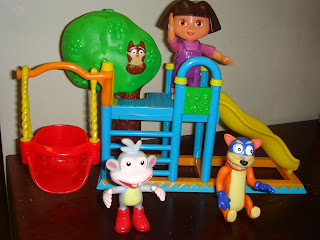
Aaron's mother asked me, shortly after I started working with Aaron, Don't you get bored as you play like this. All we are doing is putting Dora characters down a little slide over and over and over? I don't think I can do this, and stay excited like you do, because I get bored after just a few moments. Aaron's mom took a break in a high paying professional career to stay home with her son after his diagnosis of autism, so she was committed emotionally but she was genuinely worried that she did not have the capacity to use play as a therapy intervention. I get this question, in some form, from parents, classroom aids and personal care attendants. Sometimes I don't get the question, but I still need to answer it because it is clear as they play that boredom has set in. To deal with boredom, some adults tune out and stop playing with emotional energy. Others start to complicate the play so that the play is more interesting from the adults perspective, meanwhile making the play too complex for the child. Playing with a child is not a skill that all adults just know how to do. Since our discussion, several years ago, Aaron's mother has become a world class play interventionist. With her then, and with many willing but hesitant play partners since, I keep trying to find ways to explain how one can play, even quite repetitively and not become bored.
It would be boring to play like this, I assured Aaron's mom, if that were all I was doing. I explained that I do each repetition in the game like a stage performer does a stage play, night after night. It would be boring for the actor if the actor did not need to vary the performance in subtle ways, moment-to-moment, to insure audience enjoyment. A joke told in the exact same way might be timed perfectly on the first night but fall flat the next night if the actor was not reading the audience well. So the joke is told in a slightly different way based upon some amazing communication between the audience and the actor. When an audience and an actor are connected and communicating, the feeling is exhilarating for them both.
Your audience is your child. The responce that you are looking for is attention, increasingly complex social engagement and learning. In order to help your child become increasingly engaged in play and insure learning, you will need to vary what you do in small ways at the right times--all based upon what your child does moment-to-moment. The connection that you feel, when this goes well is anything but boring.
Many parents can learn to do this and, in fact, parents often have an advantage over me as a play partner. As a parent, you have has established more of a connection than I can--simply because you have more time with your child and you are more emotionally bonded.
Another analogy that might clarify the part that repetition plays in the whole experience is rock climbing. This is apparently a very repetitive activity but it engages climbers entirely because in order to do it and survive, the climber must choose every step carefully. The climber might look as though she were just doing the same thing over and over, but her every move is actually based on information that comes from the rock. In rock climbing, it is a good thing that much of the action is repetitive so that the climber has the mental energy available to focus on the stability of each rock and choose carefully.
Far from being boring, playing with a child who has autism requires great focus and thought. Some children might do most of the work in play and the adult can slack off mentally and the play will continue anyway because the child works hard enough for them both. Not so for a child with autism. Early on, the child with autism does not know how to play or even what play is and the adult has to do the work for both of them. The repetitive nature of most early games with children allows the adult enough mental energy to both play and teach the child to play. Aaron's mom, now a champion player, is working these days on learning to slack off when she plays with her son. He now needs to learn how to bring elements of order and excitement to the play himself. Aaron's mom is now teaching him to do more of the work of initiating and maintaining play--but that is a different blog post.
Meanwhile, if you want to hear more about the slide game that looked so boring to his mother initially, I will post about that tomorrow. Step-by-step, blow-by-blow rendition of the Dora on Slide Game, coming soon.... (with video clip)




1 comment:
I have a very low boredom threshhold so it was quite a challenge for me with the repetative nature of 'play,' but we stuck at it for years. Certainly worth the payoff.
BEst wishes
Post a Comment